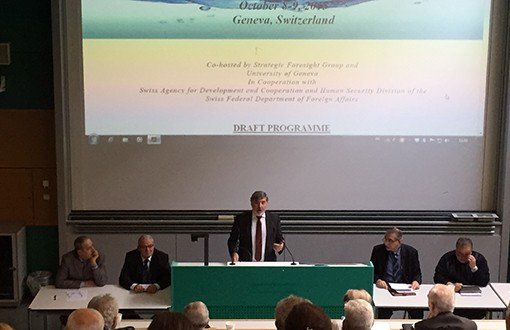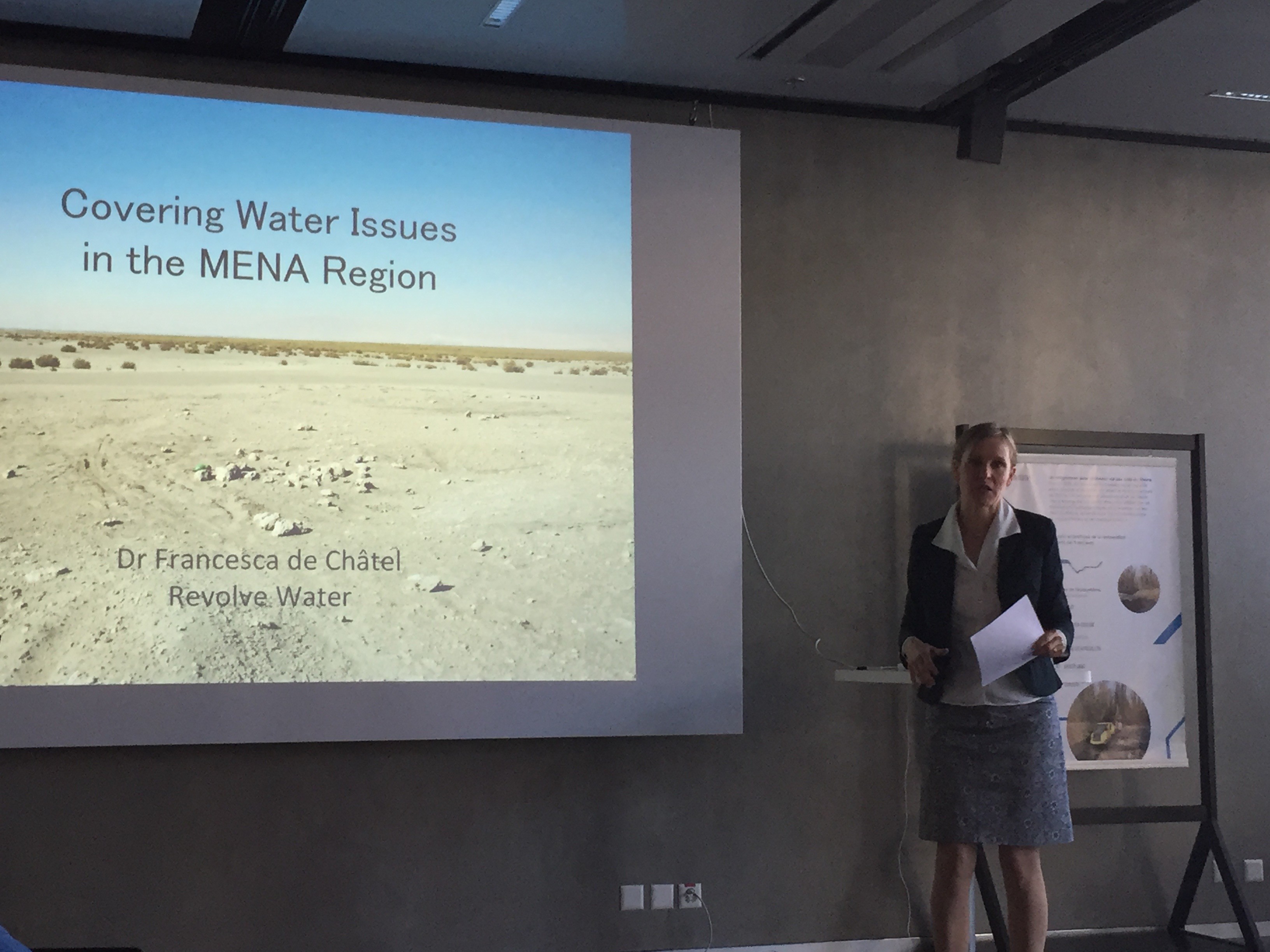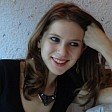THE BLUE PEACE ON THE MIDDLE EAST HIGH LEVEL FORUM
Resolving Conflicts: Water for Peace, Peace for Water

With the end of the cold war nurtured with the liberation from a bi-polar world, an atmosphere to resolve the conflicts that were locked in the compressed duality of the era was starting. While new social movements were starting to emerge, the environment arose as a crucial field never to be underestimated again. In this period of drastic change water, which is one of the basic needs of human life also started to develop as a crucial topic, a resource and a tool in conflicts and the resolutions.
Since the start of history there has been conflicts on water. Especially with the emergence of new states after the 1950s disagreements all over the World began between the upstream and downstream countries that led to the establishment of international norms and actions. With scarcity and environmental change the notion of "water wars", "water conflicts" have been debated.
While the international cooperation is growing still the conflicts of water, the scarcity and the mismanagement of it is a crucial subject. International Food Policy Research Institute has warned that in 2050, 52% of the world's population will be with exceptionally scarce water supplies. The year 2050 does not seem so far away.
Finding ways for international cooperation
The Blue Peace framework with the in-depth research and international collaboration of the Strategic Foresight Group tries to answer these questions and aims to transform water into an instrument of peace, security and cooperation.
The Blue Peace initiative was launched by Switzerland in 2011 and is based on networks of academic and technical experts as well as on the policies of the countries -Turkey, Lebanon, Syria, Jordan, Iraq, Israel and Palestine- with the aim of ensuring the implementation of existing agreements. The Blue Peace initiative seeks to attain the regional coordination with a broader scope that can be more useful for promoting peace than technical agreements.
In this perspective the Blue Peace in the Middle East High Level Forum organized by Strategic Foresight Group, University of Geneva in cooperation with Swiss Agency for Development and Cooperation and Human Security Division of the Swiss Federal Department of Foreign Affairs took place in Geneva at the 8th and 9th of October set off with the aim find the ways to build an international cooperation resolving water conflicts.
The meetings were attended by academics, water experts from the Middle East members of Parliament, media leaders.
Can media play a role in changing perceptions of water?

The first session that took place on the 8th was led on the capacity of building of media for water. In this respect researchers and journalists working on the Middle East made presentations on hydrology and environmental changes, discussed the possibilities and limits on reporting on water.
As water is a significant subject it possesses newsworthiness but how to report? What makes water stories so challenging? Can media play a role in changing perceptions of water? These questions were met with the mutual response to report creatively with focusing on success stories, personal stories with the use of info graphics and visuals, emphasizing on the change and the necessity of this precious resource.
Session of the high level forum
The session of the high level forum that took place in 9 October was opened by Mario Carera, Thomas Greminger and the address by Abdulsattar Majeed Qader, the Minister of Agriculture and Water Resources in the Kurdistan Regional Government.
In his speech Qader emphasized the role of conflicts in the region as one of the main hindrance to guarantee the access of clean water and suggested to form a high water community through rising public awareness.
Support for water politics that provides peace and security
"The Kurdistan Regional Government has made modern attempts to collect rain and spring water to provide cleaning water, building modern technology in agricultural watering to minimum water go to waste, and giving farmers loans and material support for buying the equipment."
"The real challenge is climate change and the phenomenon of global warming has caused drought in our region and it gives threat. We support water politics that provides peace and security, new rules and laws compatible for the region. The majority of our water sources come from Turkey and Iran. The shortage in drinking water has deteriorated due to the influx to supply the refuges whose number has reached 1,5 million.
We turn to our neighbors to supply us with the sufficient water and we refuse using idea using water as pressure and subjugate other nations. We request further assistance and cooperation concerning water. "
John Alderdice, Former Speaker of the Northern Ireland parliament and currently the Director of HMC Centre for the Resolution of Intractable Conflicts at Oxford University underlined that one of the reason for the influx of refugees was the lack of sufficent water and the biggest problem on the water issue was convincing people of the urgency of the problem.
The European project is a continuing peace process
"After the Second World War the European cooperation started not with a political agenda but trade of steel and coal. Today, yhe European project is a continuing peace process it is not solely and economic agreement. Europeans focus on the instruments of the European project. Water is an instrument to address conflict. In the Middle East we focus on water because without it we cannot survive.
We are in Geneva where the headquarters of Red Cross is. The Red Cross has convinced that when there is a situation of first-aid it goes before war, before conflict. We need an agreement like this for water. "
Safa Al Sheikh, Deputy National Security Advisor to the Iraqi government underlined the urgent problems that grew after the emergence of ISIS in the region.
Iraq has lost 50 percent of its water resources
"Just to have an idea of the water problem in Iraq from 1990 until now Iraq has lost 50 percent of its water resources. There are different reasons for this. In this strategic environment there are 5 threats that influence this problem: Population growth, climate change, water policies of the countries that work individually without cooperation, the threat of ISIS and the complexity of the region.
ISIS uses water as a political tool
"ISIS used water as a political tool. For a short period they controlled the Mosul dam. They controlled one dam in Syria, one in Iraq and deny the people from the people and damaged the agriculture. "They use it in two ways. They deny many areas water. This leads to migration and internal security problems."
Hajim Al Hassani, member of parliment of the Parliment of Iraq added to Sheikh on the role of ISIS and proposed the formation of an international organization for the matters of water.
The instutions in Europe helped bringing peace to Europe
"For the resoulution of conflicts international instutions played an important role. We have Gulf Cooperation Council limited to Gulf countries. We did not have an instutions for incentives on peace. I hope one day we can establish something like European Union.
Jamil Nimri Member of Parliament from Jordan stated that Jordan is the 3rd country in the world to have water scarcity and have pointed out that the occupation of Palestine and the Syrian crisis has effected Jordan negatively.
The Syrian crisis worsened the water scarcity
"Jordan is a downstream country in both the Yarmouk and the Jordan river. After 1967 Israel has been denying the right of water to Palestinians both Israel and Syria diverted the flow of water to Jordan. Jordan seeks for international support for a sustainable solution. The current situation in the region hinders development for water.In Jordan the massive influx of refugees worsened the water issue. "







